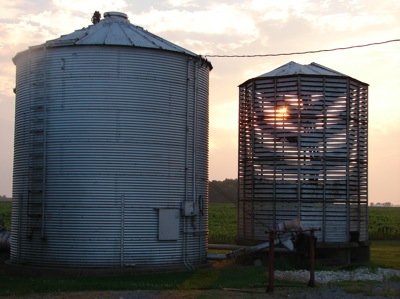Tuesday, August 5th, 2008
Area farmers: keep on raining
By Betty Lawrence

Photo by Janie Southard/The Daily Standard
Sunsets on Mercer County's agricultural landscapes are frequently picturesque even though they sometimes precede a nighttime storm as was the case on Monday.
The 1.05 inch of rain that fell overnight will help area crops, but more rain is needed, says local weather forecaster and farmer Dennis Howick.
"It was enough to help, but more is needed in another week," he said.
According to Howick, farmers need at least an inch of rain a week up until the first week in September to allow crops, especially corn, to fill out.
"Right now, corn is setting on ... and soybeans too are making grain right now and need the rain," he said.
Todd Mangen, educator at the local Ohio State University Extension office, said the area hasn't reached the critical level, but is headed that way.
He said the southern part of the county only got 0.03 inch of rain last night.
"Yes, we really need the rain now as the corn is pollinating and any rainfall right now will go a long way, as the crops are fully canopied, meaning it won't evaporate so fast," he said.
Showers are predicted for later today, followed by clearing and lower temperatures, paving the way for great weather conditions for the beginning of the Mercer County Banner Fair on Friday.
It has been an atrocious year for planting corn and soybeans, Howick said, noting some farmers were replanting up until the end of June due to wet weather during the planting season. Those farmers are praying for a late frost to allow time for the crops to grow, he said.
The overnight rainfall was accompanied by several rounds of thunder, lightning and wind, but not enough to cause damage, he said.
There were no reports of power outages in Mercer and Auglaize counties.
The barometric pressure this morning was low, contributing to uncomfortable conditions for people with allergies and sinus problems.
"For some reason, when there is a change in the barometric pressure, most people, including me, are affected when you go from a high pressure to low, rather than the opposite," Howick said.

